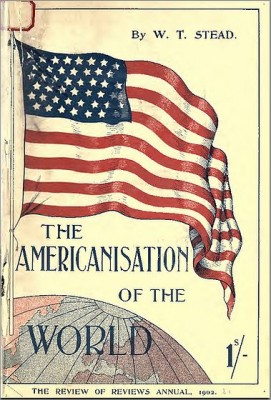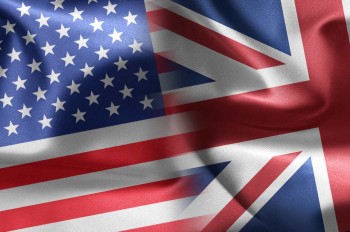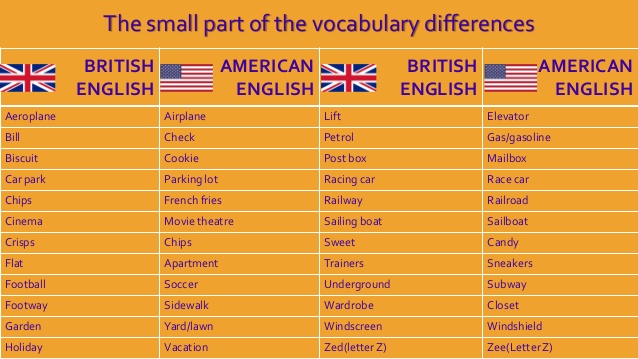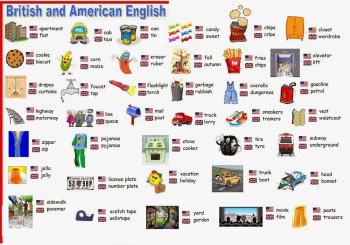…two nations divided by a common language…
When I started writing articles for DCT a couple of years ago, the team would get together for a Skype session once a week, comprising three Americans, one Australian and a Brit (there’s a joke there somewhere). You can probably tell that I’m the Brit as I use fewer zees (zeds to me) when I write, but that’s by the by. Clearly I’ve conversed with some Americans before; heck, I’ve even been to Disney World, where there were quite a lot of Americans and we seemed to understand each other, most of the time anyway.
However, there are words on both sides of the Atlantic that haven’t quite survived the special relationship and remain firmly rooted on one side or the other, sometimes crossing the divide, but not always. For example, the tomato divide continues and probably always will, until we pronounce Moscow and router the same way, which we probably won’t. You see, I find that it’s easy to forget the differences if not practiced regularly, although YouTube and Netflix often give me a jolt and I can be found murmuring ‘What the heck is he talking about?‘ A great example of this is my stepson who, although fluent in English, speaks it in an American accent and uses American words and phrases, which I would pinpoint to somewhere between Chicago and New York via Indianapolis, or thereabouts. It’s uncanny actually and he’s able to flip back over to British at the drop of a hat, so it occurs to me that his vocabulary is therefore much richer for both living under the same roof as a Briton, yet absorbing the contemporary culture of America through the media he’s so enthralled by.
The Special Relationship
“Head over to the closet, open the faucet, rinse out your comforter, trim your bangs, then grab the diapers“. I beg your pardon? Of course, to most Brits that would mean very little, just as “I’m chuffed to bits, so I’m just popping out for a fag, then I’ll be back for a bit of how’s your father.” may not mean much to an American either. Coincidentally, many years ago we visited my brother who was on assignment in Tampa, Florida and one evening he took us to what he described as a typical redneck bar. Once we were settled with our ice cold Buds, I lit a cigarette and said, far too audibly “Hey, I’m trying out all the local fags you know!” at which a deafening silence descended, I could hear the ceiling fan spinning and I became the object of attention for a dozen beer swilling blokes sitting at the bar. I don’t recall finishing my beer, but I do remember that’s when the learning curve started.
Vive la difference!
Whilst the differences in spoken English are more obvious, those in the written word are a little more subtle. You can get away with most of the differences; words like aluminium, rationalise and honour are clearly spelt differently by our American cousins and when I started writing articles here at DCT, I was tempted, very briefly I might add, to Americanise my writing to fit, but thought better of it as I felt it would have been a denial of my British roots. However, my fag experience did at least teach me that certain words just won’t cross the divide and are therefore verboten; which reminds me of the book I’m reading, Life by Keith Richards, which he’s written in American English, presumably to cater for a largely American audience, which for me was a total cop out. A bit like when The Madness of King George was released, being originally titled The Madness of King George III, but the producers apparently dropped the ordinal as they were under the impression that many Americans would think the film was the third installment, like Rocky III. A gross insult to most Americans in my view.
https://youtu.be/nLmtrI9QjLk
Words such as crisps, fanny, shagging (a dance in The Carolinas evidently) sod, willy… you get the point. However, if you as a Brit should stroll into an American diner and ask for fish and chips, you know, somewhere really off the beaten track, would you get a floppy trout and a bag of crispy fried potato peelings? It’s a thought isn’t it? And this is also true for other languages such as Spanish and its variants in other countries. Words such as coger and concha in Madrid are perfectly acceptable, yet in Argentina they have a completely different meaning and may well end up with a slap in the face being delivered. Incidentally, many Argentines resent my referring to our cousins up North as Americans as they reckon that both North and South America are populated by Americans, so I say “How about North Americans then?” to which they reply “I suppose so; but they’re Yankees really.” As they say across the pond, go figure!
But really, isn’t it just a case of it isn’t what you say, but how you say it? Like there are so many ways to say f*ck, which thankfully has universal application and can be lent to any given situation, good or bad. Perhaps it’s because American English is more direct, more to the point, whereas we prefer to beat around the bush a little more, so to speak.
https://youtu.be/gpsvofwD3RM
The Brits are coming!
Writing in American English is one thing, but speaking it in that accent is quite another. A couple of weeks ago I got home from work and no sooner was I through the front door than I was press-ganged into doing a voice over in a university project for Alexis, the stepson I referred to earlier. Initially I responded very favourably and began to puff out my chest at the thought of a Richard Burton moment, whom I do quite well, if you don’t mind me saying so. But no, I was to be Jim Jones musing to himself over his life in a short sixty second clip; in fact I had to really rack my brains on that one and for some odd reason, the only word that came into my head was Jonestown as I had always mistakenly thought that it was the singer George Jones who’d got all those people to top themselves and then blow his own brains out. But back on topic, Jones was in fact from Indiana originally and my knowledge of the Indiana accent is confined to hearing Mr David Hartsock speak, where in fact, when the words came out of my mouth, I sounded more like Bill Clinton with a hint of Jimmy Carter. Why should that be? I’ve no idea, but I do know that doing an American accent is not the walk in the park it’s made out to be.

It could be that my addiction to The Walking Dead, where most of the cast appear to be British, including Andrew Lincoln aka Rick Grimes, brought out a hint of Georgia in my voice over, who knows? But it’s also true that British actors playing Americans, live and breath the accent day and night so they can get it just right. Look at Hugh Laurie; many still believe he’s American. In fact, it wasn’t until season two that I discovered Rick is actually a Brit and to be honest I was completely gobsmacked. Conversely, American actors also have the uncanny ability to carry off a British accent with equal aplomb and they don’t get much better than Meryl Streep and Gwyneth Paltrow who have the ability to sound so British that you can’t see the joins.

But is it wrong to want to cherish and protect one’s native language and the idiosyncrasies that make up its richness? Certainly the French are robust in their efforts to maintain the purity of their language in the face of an assault from English, either American or British. In fact, in 2013 the French higher education minister wanted to change the law so that some courses in universities could be conducted in English for the benefit of foreign students. For many academics and intellectuals though, particularly the Académie française, this was considered to be linguistic treason.
In 1997, 40 per cent of documents at the European Commission were first written in French, compared to 45 per cent in English. In 2006, the ratio had fallen to 14 per cent French versus 72 per cent English. By 2009, French was at 11 per cent.
But now I’m veering way off topic, which is unusual for me and got me wondering whether, if an American wrote for a perceived British audience, would he write the piece in British English? I’m not aware of any examples, but would gladly see some. OK, I’m a self confessed puritan when it comes to the English language and I can’t see that changing in the foreseeable future or to put it in American, anytime soon. Naturally, loads of words are crossing the Atlantic from west to east and much of that is down to the Internet, in particular social media where most of us are now referred to as guys. So sure, I guess we’ll take a rain check before we step up to the plate and hey, we’re all good.

In the UK, the use of Americanisms is seen as a sign that culture is going to hell.
But wait, it turns out that it’s not one way traffic after all. Seems like we Brits are exporting our very own form of English over to the New World, where you’ll now hear the folks of Chicago and New York dropping words like gobsmacked, gormless (my personal favourite), trousers, fortnight, ginger, snog, twee and spot-on, into their everyday conversation, I kid you not. Some even say that it’s cool to sound British in America, in the same way that Blair liked to promote Cool Britannia. The balance however is very much slued the other way through a slow process of osmosis, the biggest culprit of all being the BBC who seem to have forgotten that they are owned by the British taxpayer as they march towards Americanisation of their news and current affairs programmes. It’s quite shocking to hear BBC presenters utter Fess up instead of confess to, May 10 instead of May the tenth, nine through five instead of from nine to five and the worst of all could of been instead of could have been. Either way, whilst not exactly hanging offences and whilst one doesn’t expect the BBC to be hip, we expect it to inform, which is what they do so well as we see here with Obama and Cameron jousting at The White House.
Does it really matter if we speak American, British or Australian? Does it matter if British English becomes a fudged transatlantic pot pourri where we become almost indistinguishable from our friends across the pond? What do you think? Or maybe this is what Churchill meant when he said this:
To improve is to change, so to be perfect is to have changed often





Comical Marc,
I am an Aussie, naturalised, from Britain, I speak with a part Aussie, part British accent and I use many British comments, eg “Sod off, naff off or sod orf” for “Go away, get lost, etc:
‘Bonking’ for sexual intercourse, ‘bloody Nora’ for good gracious, ‘plod’, ‘peelers’ or the old Bill’ for police, and many more although you may also know many ‘different’ words.
Apparently Princess Anne was the first to coin the word ‘naff’, which as you know means something or someone that’s not quite up to the mark.
I am from southern Appalachia and love the differences in our language. Here is a website under construction that, although difficult to navigate, has a few examples of dialects in the area: http://artsandsciences.sc.edu/engl/dictionary/ . The backstory is at http://www.knoxnews.com/news/new-website-to-feature-1939-smoky-mountain-field-recordings-of-appalachian-speech-ep-361019887-357107751.html .
Hi Vester, In the British Isles there are 56 basic dialects, and innumerable off-shoots, even in different streets on the other side of a village have their own unique words or sayings.
And the various American, Australian, etc. dialects can generally be traced back to specific locales in the British Isles by their similarities to various dialects there.
Hi Marc,
“…nine through five instead of from nine to five and the worst of all could of been instead of could have been.”
Anybody who says “could of” is making a grammatical error regardless of their country of origin. Unfortunately, North Americans bastardize their own language beyond belief and no one seems to care a single jot.
“Nine to five” and “nine through five” have two different meanings: “Nine through five” is inclusive whereas “Nine to five” is not.
I had to look up “slued” because I was sure you meant “skewed”. I found out they had the same meaning.
It’s a sad time for literature. I don’t believe there is such a thing as an editor these days. Simplistic grammatical errors abound, even foisted upon us by the top publishers in the land. How can we possibly expect our young to learn correct language skills under these conditions? What makes it worse is that it is self-perpetuating.
Something I find confusing though, is if you call a yard a garden, what do you call a garden? There are other examples, but one will do.
Interesting post, Marc, and I learned something today,
Richard
A little poetic license is required for slued, whereas skewed is probably more appropriate.
We call a garden a garden. It could be a front garden or a back garden, but each may have parts that are not a garden as such, like a rockery for example or even a vegetable patch.
A vegetable patch? How quaint.
If you choose to use the word ‘garden’, how does the listener know that it is indeed a garden and not simply a yard?
Note: I’m sticking up for the Yanks here…
I always thought you North Americans referred to front and back gardens as yards, whether actually resembling actual gardens or not.
I may have been living under this misapprehension (and others) all my life.
Hi, in Britain a yard is a yard, never a garden. A yard is usually earth or concrete but not grass in which case it would be a lawn. A yard may have plants in pots but rarely in borders. A garden can be a flower garden or a vegetable garden but is never a yard. Does this help?
Oh and Marc I’ve never heard of footway (US sidewalk), it’s a pavement (urbanisation) or footpath (rural). You walk on the pavement or down a footpath. Maybe footway is a modern usage for the above but I’m not familiar with it.
Here in Oz, the area/land behind and in front of the house is known as the yard – back yard and front yard. Gardens are separate areas within the yard where vegetation other than grass grows – plants, flowers, vegetables, etc.
@ Jim Hillier
That’s pretty much the usage in at least large parts of the US, as well.
‘Yard’ is any part of the land surrounding the house that isn’t specifically garden (vegetable, flower, rock, etc.), forest, swamp, bodies of water, cliffs, driveways, or outbuildings. If it has actual grass on it, it also qualifies as ‘lawn’.
I have a friend who has two back yards mostly separated by a 8-foot cliff except at one end where there is a path sufficient to get a riding mower up and down with only moderate peril.
No, no ,no!
A yard is a hard standing, usually constructed of concrete or asphalt.
Schoolyard for example.
I inquired a few years ago at the Anderson Independent-Mail in Anderson, South Carolina, USA, after an article said peddling (a bicycle) instead of pedaling. I was told that they have not used “copy editors” since they started using computers.
I don’t believe a computerized editor will ever be able to replace the intuitiveness of the human. And if they’re never being used in the first place, then we have everything to worry about.
Richard, also in Australia, ‘could of”, ‘should of,’ would of’ are commonly used.
Equally as bad is the use of ‘actually’. Most people now say, “I actually went to the shop”, and they ‘actually’ perform a task every time they perform a task of any description, as if there is difference in the action instead of the good old basic, saying, “I went to the shop”.
JoninOz….;-)
Good point.
Another thing that annoys me is the use of redundancies when it makes no sense, such as, ‘delete it out’, or. ‘separate it out’; they both imply that separating it in is a valid choice. Personally, I’ve never heard of such a thing.
How about the common use of the word ‘acronym’ when, in fact, they mean abbreviation. The terms are not interchangeable and one does not necessarily negate the other.. The users must have a desire to appear intelligent. Too bad, because they must never have listened to the caveat:
“Better to be thought a fool than to open one’s mouth and remove all doubt’. ~ B. Franklin, I think…
This is but a tiny rant, I could go on ad infinitum,
I will now give you all some peace,
Richard
Abraham Lincoln I think made that comment.
+robert charter, I’m pretty sure you’re right, it was Mr Lincoln.
The only proper time to use ‘actually’ (in any variant of English) about completing a task is if there was some doubt (genuine or ironic/sarcastic) about doing so.
LOL, this had me going. Good thing I wasn’t drinking tea otherwise it would have spewed all over the monitor.
I am lucky – was stationed at RAF Alconbury. And I prefer roasted chicken crisps with my pint. 🙂
That sounds delicious!
Seems Canada was omitted. We’re just north of USA, occupy the second largest land mass, have one of the largest tree forests, and plenty of fresh drinking water; just to mention a few items. We blend the meaning of both British and American words, as most of what we see in movies and the tube is from these two countries. But, we have different expression, like the one I enjoy using, go figure, Mindblower!
While I have said “North American” in past replies, I must mention that I had reservations. As I expected, Canadians are well within the boundaries of ‘North America’, and should be so noted. Forgive me, please…
I have nothing but respect for my northern neighbors, and oft times, have wished I lived there myself.
Richard
Mindblower,
An afterthought:
I just wanted to add that I have spent many an hour in Canada and have loved every minute. The country is beautiful and the people are beautiful, too. Thank you for welcoming me…
I’m on the wrong side of sixty and have many fond memories of that magical land,
Richard
Richard, you’re forgiven, as most take the words “North America”, to mean USA. Do have a silly one for you. My brother in law was having a “garage sale”, but called it a “yard sale”. since at that time, he had no garage. And he was not from Newfoundland, Mindblower!
In Southern California we call them yard sales whether or not we own a garage. Of course nobody sells a yard or garage.
I am Australian and when I went to school, we used the Oxford English Dictionary as a reference. Webster dictionary was a big no-no as we were told to use correct English not the American version. From the table above we use most of the words the UK use, except for football (we use Rugby League or Rugby Union or Australian Rules or Soccer) and footway ( we use footpath). I am a third gen Aussie and my daughter is 4th gen but she married a fellow from Northern Ireland and lives in England. As a result we spend a bit of time in UK and have no trouble with communications so long as we stay away from Aussie slang.
Hi Richard,
The house sits on a ‘plot’ of land in England, the front clear area between the house and the footpath, apart from the concrete driveway it the garden, even if it is covered in grass and weeds. The rear area between the house and the side and rear fences is still a garden. If the front or rear area are paved, then they become yards.
Some citizens, mostly senior males rent a small area of land from the local council, this is an ‘allotment’ which they surround it with a fence and grow vegetables.
An area of land in Australia for building houses is known as a ‘block’ of land, in New Zealand it is a ‘section’.
Variety is the spice of life…..;-)
Thanks for the DCT team allowing us to ‘stray’ in a light-hearted manner.
Jonno
My daughter lives in a 5 bedroom home in England and it has a large front and back yard – not as big as our 40 perch block though. They have plenty of bushes and flowers planted in gardens around the fences but my son-in-law is very proud of his lawn. I helped him with the lawn and gardens. I like walking through the English countryside. They also have some very lovely parks.
I agree with Jonno thank to DCT for allowing to have this little aside from computing – it is very amusing and entertaining.
I see many youtube videos of repairs & it took me some time to realise what people in the USA were saying – they would pronounce SOLDER without the ‘L’.
I had never heard of ‘SODDER’ & after a good while figured out what was going on.
I am English born, and bred (and educated ;-)). In the table above you mention British English as “Footway” (never heard that one before) and Australian Gary refers to it as a “Footpath” which I would associate more with a path for walking across a country field or area (as in the bush?). To a Brit an urban footpath i.e. an area for walking at the side(s) of a roadway is surely a “Pavement”.
As to the ‘Garden’ versus ‘Yard’ I have always understood “yard” to be a paved or hard-surfaced area usually associated with a trade such as a “builder’s yard” “timber/lumber(US) yard”, “car yard” etc. and a “garden” to be an area, front and or back, of a domestic or business premises with lawns, bushes and plants, etc. I understand that in the US a ‘garden’ denotes an area we Brits would refer to as “Gardens”, in other words something much larger than a domestic plot such as “Queen Mary’s Gardens” or “Kew Gardens” or “Kensington Gardens”, etc. these all in London.
I have found in my trips to the US that, when speaking to the ‘natives’, if I use some very distinctive American expressions but voiced in a slightly exaggerated British accent it is greeted with roars of laughter most often leading to another free ice-cold beer!
The English need not worry. I plan some day to take a holiday over the pond and teach the Brits how to speak proper English. American style.
True story:
Not long after joining DCT, many many moons ago, after submitting several articles all written in British English, the following conversation took place between myself and one David Hartsock:
Dave: We’re going to have to do something about your spelling.
Me: Why, what’s wrong with my spelling?
Dave: You keep using an “s’ where it should be a “z”, and putting a “u” in words where there isn’t one (like “color” for instance).
Me: But that’s the correct way to spell those words.
Dave: No it isn’t.
Me: Well there’s probably about 100 million people is the UK, Australia, and New Zealand who’d be prepared to debate that with you.
LOL
I’m Welsh and get a little tired of being asked where in England Wales is by my Californian Wife’s friends and relations.
The real difference between the two nations is that Americans have no idea what ‘snap’ means when they say the same thing simultaneously.
In Britain we are brought up playing snap and are indoctrinated into looking for the ‘sameness’ in things and peoples. Americans seem to look for differences first.
As far as Austrailians are concerned I have no idea where they stand on the ‘snap divide’.
Hi Jon – I was born is Wales, Newport to be exact. Emigrated to Oz in 1960. Australians are very much snap conscious. Many of the British traditions are followed here, the one notable exception is probably community singing on bus/coach trips. Not sure why that might be, but coming from Wales, I do miss it.
It’s a conspiracy – Jim from Newport, JDT from Caerphilly and me from Cardiff.
If only we could get someone from Barry elected as Austrailian PM….. ;oP
I think the sensible ones of my generation (I’m 61) saw the writing on the wall and emigrated, much as I love the place we’ve been having our ‘closing down sale’ here for a few decades. It’s like half day closing every day (and I know the USA readers will be scratching heads at that comment).
I have a little experience of the differences as my wife and I met 16 years ago on the old microsoft messenager and learned very early to stop and think ‘Did they really mean that?’ before replying to an odd comment. Probably why we’ve been happily married for 15 years!
The singing isn’t what it was. Churches are closing faster than pubs and there isn’t the core that know the harmonies any more. Even the English drown us out sometimes with their ‘Swing low….’
Getting back to the subject ….. accusing an American of being ‘Nasty’ can have very odd results as it means something entirely different in American. Making a mistake in pencil and asking for a lend of a rubber causes shocked silence and it is not advisable to shout ‘Anyone got a rubber?’ in the workplace.
The latest bit of civilising we have been doing is giving electric kettles to USA relations as presents. What we have been relying on over here for almost 100 years are new fangled devices for many in the States. When Great Aunt Patsy (92) got hers we were sent a picture of her and numerous cousins watching the amazing new gizmo.
It’s all good fun,
Jon
P.S. I remember seeing an episode of Morse where he came out on the use of ‘z’ in the USA style instead of ‘s’ was correct Oxford English……. and she who must be obeyed has never let me forget it 😉
LOL. Well, “fanny” is the one that gets me. US news report says; “she slid down the hill on her “fanny”. Always gets a good chuckle in our household. 🙂
Where about in England is Wales?? HA! HA!
I did an extensive bus tour of UK in 2005 – I was there when underground and buses were bombed – it was very scary. We toured parts of Wales and I must say it was very scenic and people very friendly. My mother’s grandparents came from Manchester, Isle of Wight and Scotland.
Back in 50s and 60s when I was at school – it was the Queen’s English that we were taught and spoke. Now children speak whatever the want and don’t know what grammar and spelling is.
Hmm, I live in Caerphilly South Wales and it now appears that everyone under thirty speaks with an intonation akin to the cast of neighbours (spelt with a ‘u’).
I live in a Caribbean island where we have British heritage and American cultural infiltration. Started school in the 1970’s when we were taught correct (British) English, but now the internet and other media is affecting how modern children learn.
Just like the writer of this article, I hesitate to write American English when posting on forums and other internet sites, and usually revert to British English because I know that’s the “right” thing based on what I was taught at school.
I’m a bit puzzled over the American car trunk and hood, and British boot and bonnet. I grew up saying trunk and bonnet, so I guess I must be half American and half British.
The other Americanism I’m forced to use is their date format – Month Date Year. I was originally taught Date Month Year, and then at one time it was suggested there was some international standard requiring Year Month Date. I detest writing Date in the middle, but computers “think” in the American format.
In my job it is a constant headache explaining to customers if an expiry date such as 1/12/2016 is January 12th, or 1st of December, and it all depends on the source country of our imported goods. Of course 1/13/2016 or 13/12/2016 is obvious, as there’s no 13th month.
Good point Tony. day/month/year makes perfect sense to me, it’s a natural progression – month/day/year not so much.
When talking timber (sorry “lumber”) sizes, we always say 4 by 2, Americans say 2 by 4. Go figure!